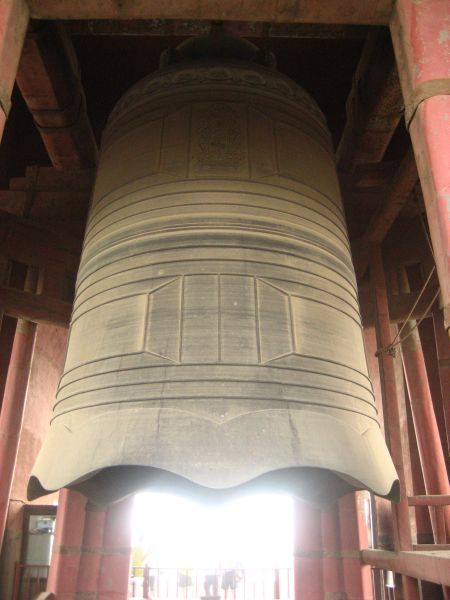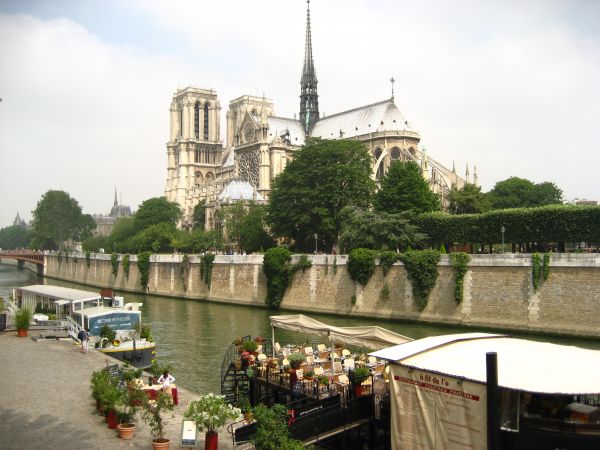The last part of my transsiberian experience leads me towards Beijing, the swarning capital of an in-a-ferment country. I share my compartment with 3 Irish girls for this 30-hour journey. I spend a lot of time with a Spaniard I sympathise with and in 30 hours, we have time "to make again the world several times". He feels the painful experience of losing all his documents: passport, plane tickets, credit card and money. I try to help him smattering a few words in Chinese. The responsible of the restaurant-carriage will bring him back a few hours later, without the money. A great relief and a lot of problems avoided.
The rest of the journey is cadenced by the Mongolian border before stopping at the Chinese one for several hours. The Chinese railroads width is different from the Russian and Mongolian ones. Each carriage is lifted to a few meters from the ground thanks to powerful hydraulic ram. A lot of Chinese workers bustle about changing the boggies. The train is reconstructed and we stop for an hour at the border train station.


We cross the inner Mongolia that politically enjoys a kind of autonomy such as Tibet. The train splits huge green steppes before going through a hostilest nature. A serie of bridges and tunnels precedes a softer nature getting near Beijing.
The seething economy can be seen everywhere. Bridges and roads building in progress, reinforced concrete of the skyscrapers overhanged by gigantic cranes symbolise the awakening of a giant. In some districts, the architecture is excessive. Hutongs (meaning "alleyway" in Chinese) vanish every day, replaced by ugly glass-covered towers sweeping off bits and pieces of the Beijing spirit in the same time. These tiny lively alleyways and the Chinese white-collar workers' projects don't match any more. The neo-capitalist Chinese businessmen kick out the grandpa, leant against his rickshaw and passionately playing a game of checkers on the end of a table.
The communist party is the only one allowed in "the people's republic of China". Big Brother of the modern era, it looks after everything, from the censorship of the media to the study on the Mao's ideology at school, from the culture control to the right of interference in the foreign companies. The party is everywhere. A few exemples among others : in the libraries, it's possible to find the Lonely planet travel guides for every country of the world except China. In the newspapers which some of them are displayed under a window for the Chinese passerbies, No sign of riots or demonstrations, on the Internet, you cannot access some harmful-considered websites.
However, getting in the WTO and opening up to the capitalism, the premisses of a change, a metamorphose or even a breaking-off are on the way, Mac Donalds and KFC pullulate, the foreign tourism constantly increases, the Internet nebula stays difficult to canalyse and a lot of young Chinese students go abroad to graduate discovering another culture and a new way of thinking.
China overwhelms you when you arrive. I get off the train station and I get in another world, luminous Chinese characters draw the attention, a muggy and close heat doesn't discourage the throng of Chinese people who wander about the alleyways.




Saying a few words in Chinese arouse the smiles. I wander around these winding streets before turning off to a main street leading to a full-of-symbol square, the Tiananmen square, "the gate of heavenly peace". The Mao mausoleum holds court among the largest square in the world.


Northern to the square, the forbidden city stands. It was the house of the Qing and Ming's dinasties emperors. The inside is vast and overwhelming. Numerous curved-roofed buildings scatter in this formerly impenetrable place.







Northeast to the city, Beihai park offers pedal boats trips onto its artificial lake or strolls on its shores.






The discovery goes on northward in a hutongs district. A rickshaws colony offers a ride and sitting in this traditionnal transport is worthwhile. We stop at the Bell tower sheltering a 63-ton bell and the drum tower where a mini drums concert is performed.


The stroll ends with a retreat for one hour at the Yonghegong temple, the biggest lamas temple in Beijing, northwest to the forbidden city.



Despite the muggy heat of Beijing, a great deal of parks offer a respite time.


South to the Tiananmen square, the heaven temple rises above the Tiantan park. Its circular shape symbolises the sky whereas the surrounding square wall represents the Earth. Such as the forbidden city, this park is a touristic highlights in Beijing.





China, when you hold us.
Keyword - departure -
Thursday 26 July 2007
In the hutongs of Beijing
By dorian on Thursday 26 July 2007, 19:50 - RTW-China
Saturday 30 June 2007
Firsts steps in Mongolia
By dorian on Saturday 30 June 2007, 20:48 - RTW-Mongolia
Last post before leaving for the mongolian steppes on foot or by horse. I hope to give news ten days from now if I find an internet café. Otherwise, You'll have to wait for my return at Ulan Bataar, the 20th of july.
But, in the meantime, here are my adventures since the departure from Irkoutsk, close to the Baykal lake.
The transmongolian carriages are identical to the transsiberian ones, the only difference is the exclusively mongolian staff. My carriage is mainly composed of westerners. 4 French people I get on well with, an american woman and a Czech couple, Michael and Iveta, I share the compartment with. In their luggage, they brought a few smoked fish for the dinner. Michael, Zinédine Zidane's double, learnt the Mongolian at the university of Prague. He can communicate with the staff, I'm amazed when I can hardly pronounce the words of my phrasebook correctly. The mongolian turns out to be a very difficult language.
Classed in the family of the altaic languages, the Mongolian language is far from the other Asian languages and from the Russian it takes the alphabet from for the transcription. The distinctive feature and difficulty are the vowel harmony. Like in Latin or in Russian, Mongolian contains declensions in accordance with the position of the word in the sentence (subject, complement, genitive...). To that, you must take account of the vowels harmony, That is to say the vowel of the declension is in accordance with the vowel of the word's root. You have to be born in Mongolia to speak Mongolian!
Nice time on board of the train, we arrive at the Russian border and the train stops for 7 hours. We get off the train but the town is not really interesting. It seems exist only because the border is here. A lot of carriages are taken off and they change the locomotive. We notice the windows of one the carriages are equipped with bars because it transports under tight surveillance prisonners.


There are only 3 carriages when the trains starts again. And foreigners are mainly inside. After a few hours, the train stops again at the Mongolian border this time. The stop is shorter and train starts again at the end of evening.
36 hours after the departure and 2 nights spent on board, we arrive in Ulan Bataar. A horde of guesthouses owners try to seduce us shaking colourful signs. I look for the Golden Gobi guesthouse' representative in order to meet again my Dutch friends I met in the transsiberian train. A few minutes later and after wishing a nice trip to the people I spent these last 2 days with, I arrive at the guesthouse.
I don't know the other accomodations in the Mongolian capital city but I recommend this one. All the travellers facilities are here, from the books exchange to the laundry, from the Internet access to the TV and DVD player. But what makes the soul of a guesthouse, That's the people who are in. When you arrive, you get in a small community and a few hours later, you belong to it. The atmosphere is friendly and relaxed. Those ones who are about to depart to China or Russia cross and advice those ones who still wait for making memories of the Mongolian steppes.
Unfortunately, my Dutch friends already left for several days towards the Mongolian huge spaces. I meet a japanese, Haruki and we get along very well.

He's my guide in Ulan Baatar where I buy some missing gears for my long trek I planed for the next days. Actually, we find everything here, sleeping bags, water filters, GPS receivers, tents, gas cartridges, kayaks and above all, 1/500000 or 1/100000 detailed maps. That's perfect to prepare his own trek.
We visit the Mongolian history and the Mongolian nature museums, we also visit the main temple which shelters a superb 26-meter high gilded Buddha. Except these highlights, the city has no architectural interest and expresses the poverty of Mongolia.




Nobody comes here to stay in the capital but to see the Mongolian scenery, its out of sight steppes, its rivers full of fish, its lakes and its dunes.
Two days after arriving, I go to the Dragon bus station, east from downtown. I buy my bus ticket for Tsetsereg, in the Arkhangai province, the ticket costs 15000 tugrugs. I meet Marko, a Finnishman that share my bench for the 11 hours journey.
Monday 11 June 2007
Parisian walk before leaving France
By dorian on Monday 11 June 2007, 13:50
Before taking the plane to go to Saint-Petersburg, I enjoy my last hours in France walking alongside the Seine's banks and admiring our beautiful capital city. Tomorrow, it's the D-day, really early awakening for a plane departure at 7h40 from the Roissy - Charles de Gaulle airport and an arrival at Saint-Petersburg in the afternoon. Tomorrow night, I'll sleep in Russia, and I'll officially have the tourist status.
Here are some pictures of monuments of Paris :





page 3 of 3 - next entries »





